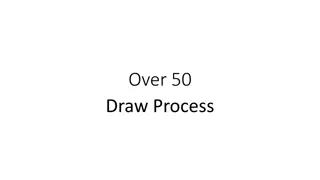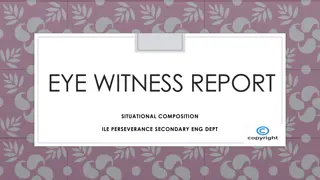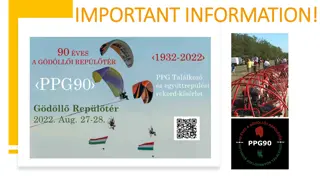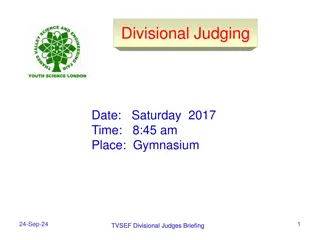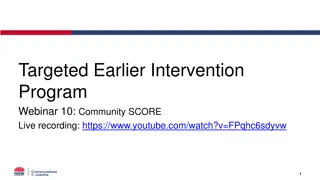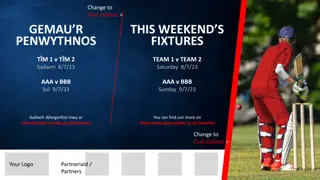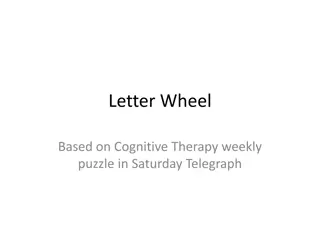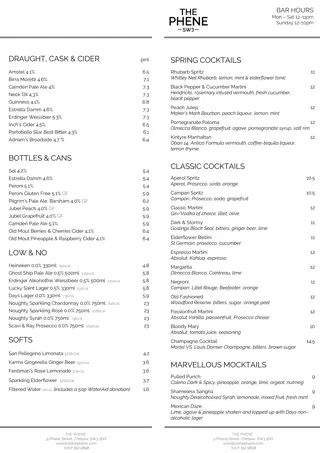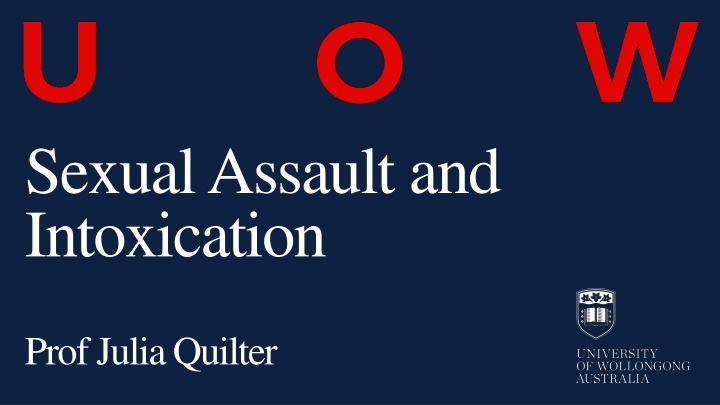
Sexual Assault, Intoxication
Explore the intricate dynamics of sexual assault cases involving intoxication, as studied by Prof. Julia Quilter and a collaborative team. Delve into the impact of alcohol and other drug (AOD) use on rape trials, the challenges faced by prosecutors with intoxicated complainants, and the prevalence of AOD involvement in sexual assaults. Gain insights into the association between sexual assault and AOD use based on research findings and real-world cases.
Download Presentation

Please find below an Image/Link to download the presentation.
The content on the website is provided AS IS for your information and personal use only. It may not be sold, licensed, or shared on other websites without obtaining consent from the author. If you encounter any issues during the download, it is possible that the publisher has removed the file from their server.
You are allowed to download the files provided on this website for personal or commercial use, subject to the condition that they are used lawfully. All files are the property of their respective owners.
The content on the website is provided AS IS for your information and personal use only. It may not be sold, licensed, or shared on other websites without obtaining consent from the author.
E N D
Presentation Transcript
Sexual Assault and Intoxication Prof Julia Quilter
Acknowledgements Collaborative project with Prof Luke McNamara (UNSW) Funding from Australian Research Council Intoxication Evidence in Rape Trials: A Double- Edged Sword? (2020-2024), Discovery Project Scheme (DP200100101) Former Chief Judge of the District Court of NSW, the Hon Justice Derek Price AM, and Chief Judge of the County Court of Victoria, the Hon Justice Peter Kidd, for granting permission for us to access trial transcripts. Victorian Law Reform Commission and NSW Bureau of Crime Statistics and Research Members of the Research Team, Melissa Porter and Sarah Croskery-Hewitt, for excellent research assistance. We acknowledge the complainants in the sexual offence trials examined in our research. Their stories are at the heart of the reports and publications produced, and their voices are present in (anonymised) quotes from transcripts. 2
Intoxication cases in the news Smee v R [2024] NSWCCA 121 R v Smith [2024] NSWDC 41 R v Martinez [2023] NSWDC 552 Pandamooz v R [2023] NSWCCA 221 Frew v R [2022] NSWCCA 165 Holt v R [2021] NSWCCA 140 Parker v R [2021] VSCA 348 Hubbard v R [2020] VSCA 303 Controversial prosecutions? Or typical (hard) cases in the 21st century? 3
Intoxicated complainants: a prosecutors view Well, they re difficult ones to run. I think most prosecutors would say that. They can be very difficult, and I think that s kind of a flow-on effect of not necessarily just the intoxication itself, but how it impacts on other parts of the trial. [W]here complainants have been heavily intoxicated and consequently don t have a full memory of what s happened if they ve only got flashbacks, or only remember portions of the evening, that can have a really big impact on our prospects, or how we run the trial. (NSW Prosecutor) Good litmus test of whether progressive law reform has yielded real change 4
Association between sexual assault and AOD use Alcohol and/or other drugs (AOD) involved in 47% of sexual assaults in Australia (2021-22 Personal Safety Survey) 67% of the trials in our recent NSW study (Quilter & McNamara 2023) involved evidence of AOD use by the complainant: International studies estimate intoxication to be a factor in 40% - 75% of sexual assaults Alcohol most common intoxicant in AOD-related sexual assault Drink spiking occurs but doesn t account for most AOD-related sexual assaults (which includes targeting of voluntarily intoxicated women) 5 Document title
Research findings: impacts on prosecution Contributes to higher attrition rates Difficult to prove that an intoxicated person lacked capacity to consent At trial, complainant intoxication relied on by defence to infer consent Also, a basis for challenging complainant s reliability and credibility Juries inclined to treat accused as less responsible where victim is intoxicated and less blameworthy when they were intoxicated (mock jury studies) 6 Document title
Legislative responses 1990s (Vic), 2000s (NSW) statutory reforms attempt to overcome complainant intoxication evidence operating as a barrier to prosecutions; and to limit accused s opportunity to rely on their intoxication to exculpate Reforms: 1. Complainant intoxication is a circumstance of non-consent (where so affected as to be incapable of consenting ) 2. Accused intoxication must not be taken into account in assessing knowledge of non-consent (NSW) or reasonableness of belief (Vic) 3. Use of jury directions on improper assumptions about AOD and consent 7 Document title
Legislative reform: Crimes Act 1958 (Vic) Section 36AA Circumstances in which a person does not consent (1) Circumstances in which a person does not consent to an act include, but are not limited to, the following (g) the person is so affected by alcohol or another drug as to be incapable of consenting to the act; (h) the person is so affected by alcohol or another drug as to be incapable of withdrawing consent to the act; Note: This circumstance may apply where a person gave consent when not so affected by alcohol or another drug as to be incapable of consenting. 8 Document title
Current circumstance of no consent/incapacity model (2022) Crimes Act 1900 (NSW) 20221 (commencing 1/6/22) s 61HJ Circumstances in which there is no consent* Old may /substantial intoxication model (2018) s 61HE(8)(a): The grounds on which it may be established that a person does not consent to a sexual activity include: (1) A person does not consent to a sexual activity if (a) the person does not say or do anything to communicate consent, or (a) if the person consents to the sexual activity while substantially intoxicated by alcohol or any drug (b) the person does not have the capacity to consent to the sexual activity, or (c) the person is so affected by alcohol or another drug as to be incapable of consenting to the sexual activity, or (d) the person is unconscious or asleep 9 Document title
Jury Directions Act 2015 (Vic) Section 46 Direction on consent Prosecution/defence can request a direction on consent: s 46(1) In making request must specify, the circumstance of no consent: s 46(2)(b) And can request trial judge under s 46(4) to (a) inform the jury of the relevant circumstance in which the law provides that a person does not consent to an act or (b) direct the jury that if the jury is satisfied beyond reasonable doubt that a circumstance referred to in section 36AA of the Crimes Act 1958 existed in relation to a person, the jury must find that the person did not consent to the act. Section 47GDirection on personal appearance and irrelevant conduct (since 2023) For the purposes of this Division, a direction on personal appearance and irrelevant conduct is a direction informing the jury that it should not be assumed that a person consented to a sexual act just because the person (a) wore particular clothing; or (b) had a particular appearance; or (c) drank alcohol or took any other drug; or (d) was present in a particular location; or Examples 1 The complainant attended a nightclub. 2 The complainant went to the accused s home. (e) acted flirtatiously. 10 Document title
Criminal Procedure Act 1986 (NSW) Consentdirections (since 2022) Section 292E Behaviour and appearance of complainant Direction It should not be assumed that a person consented to a sexual activity because the person (a) wore particular clothing or had a particular appearance, or (b) consumed alcohol or another drug, or (c) was present in a particular location. 11 Document title
Our recent empirical research Phase 1: Analysis of a decade of appellate decisions across Australia (2010 19) involving an appeal against conviction on a rape/sexual assault charge and where intoxication of complainant formed part of the evidence in the case (n = 102). Phase 2: 2 x qualitative transcript analysis studies Victoria: 33 rape trials conducted in County Court between 2013- 2020 NSW: 75 sexual offence trials conducted in District Court between 2014-2020 Phase 3: Interviews with lawyers (prosecutors and defence) with experience in rape/sexual assault trials in Victoria and NSW (n = 15). 12 Document title
Complainant intoxication evidence: findings The evidence that features in sexual assault trials is rarely fit for purpose Juries are given a major interpretive exercise with little guidance on: how to assess the nature and extent of the complainant s intoxication; and and how to connect the fact of a person s intoxication to complex cognitive functions, such as consent formation 13 Document title
Consent: Crimes Act 1900 (NSW) 61HF Objective An objective of this Subdivision is to recognise the following (a) every person has a right to choose whether or not to participate in a sexual activity, (b) consent to a sexual activity is not to be presumed, (c) consensual sexual activity involves ongoing and mutual communication, decision-making and free and voluntary agreement between the persons participating in the sexual activity. 61HI Consent generally (1) A person consents to a sexual activity if, at the time of the sexual activity, the person freely and voluntarily agrees to the sexual activity. .. (4) A person who does not offer physical or verbal resistance to a sexual activity is not, by reason only of that fact, to be taken to consent to the sexual activity. S 61HJ: Plus 11 circumstances of deemed no consent including (c) the person is so affected by alcohol or another drug as to be incapable of consenting to the sexual activity 14 Document title
Complainant self-assessment evidence: Most intoxication evidence in sexual assault trials takes the form of events recall and self-assessment by the complainant Questions about the volume of alcohol consumed and/or the period of time: Colloquial & diverse language to describe intoxication and how the complainant remembers feeling Asked to score themselves on a numerical (1-10) scale of intoxication Reliance on observable proxies for intoxication - motor skills/physical capacity to perform (or fail to perform) functions Perceived links with mental effects/sensations 15 Document title
Other forms of evidence 3rd party observations of the complainant Technology-based evidence (e.g. CCTV footage, text messages) Most trials do not feature blood alcohol concentration (BAC) evidence Expertise evidence rarely introduced where intoxication was alcohol- related Toxicology and expert evidence more common where intoxication was related to other drugs Witness colloquialism and imprecision often compounded by language used by judges and lawyers 16 Document title
Purposes for which expert evidence used Implications for complainant s memory and the reliability of their evidence Some experts gave evidence re impact of specific drugs on cognitive capacities No experts expressed an opinion about the effect of the complainant s intoxication on their capacity to consent: I would be very reluctant to [ask an expert to comment on consent] I just think it is dangerous territory to allow an expert to go to that point ... So in other areas experts do go the ultimate issue, but in this one it just feels like it goes too far to allow an expert to say if someone's consenting or not because it's about how they're thinking, what their mental processes are [Their expertise can only go to effects of alcohol, like basic effects, like physiological effects, biological effects, and yes it can impair your cognitive decision making, this is how it impairs it, it can do this, it can do this, it can do this. Whether or not [it did] do that, well that's up to you members of the jury (NSW Prosecutor) 17 Document title
Resort to common knowledge Jurors are routinely told to use their common knowledge to determine the level and significance of the complainant s intoxication Validity of assuming jurors have relevant knowledge/experience especially re drugs other than alcohol? Popular conceptions of intoxication likely to be influenced by culturally embedded attitudes and assumptions, including relationship between AOD consumption and availability for sex How to bridge the gulf from intoxication to consent? 18 Document title
Resort to common knowledge Understanding of how intoxication impacts on memory and reliability? It is common experience that intoxication can have an adverse bearing on a witness s recollection of events. It is also a common experience that intoxication can affect a person s subsequent recall of relevant events. Because intoxication can affect or alter a person s state of mind, the intoxication of a witness is relevant to your consideration of their evidence and your assessment of their credibility and most importantly, their reliability. (Crafter [2019] SASCFC 25, [72]) In many trials, juries denied the benefits of science on intoxication and memory. 19 Document title
Crown use of complainant intoxication evidence In trials in our studies, very rare for the Crown to actively engage statutory provisions on complainant intoxication to assist in proving non-consent, under both: (old) NSW substantial intoxication formulation; and so affected as to be incapable (Vic) (which also now operates in NSW) Sometimes used to explain why the complainant did not fight back Crown rarely offered a strong counter-narrative on complainant s intoxication (e.g. highlighting vulnerability and the accused s predatory behaviour) 20 Document title
Crown use of complainant intoxication evidence Evidence of communicated (verbal/physical) non-consent may be incompatible with suggesting AOD-related incapacity to consent (Smee (2024)) [W]ell it s a double-edged sword because unless you re running capability you re shooting yourself in the foot by saying they were absolutely drunk because then the drunker they are the less reliable, you re effectively conceding. So you sort of can t have your cake and eat it too. They re either so drunk that they re incapable of consenting or they re not so drunk that they re completely unreliable. You can t kind of have both. (NSW Prosecutor) Overall, little evidence that statutory provisions have re-shaped how Crown case is presented in trial featuring complainant intoxication evidence 21 Document title
Defence use of complainant intoxication evidence To assert that the complainant instigated/actively sought/participated in sexual activity strenghtens argument that they consented To suggest disinhibition andexplains bad choices To explain unusual sexual contact (eg in a taxi, nightclub toilet, park, with multiple men) To engage additional AOD-specific rape myths Document title 22
Defence use of complainant intoxication evidence As part of claim that the allegation was fabricated (eg after regretting drunken sex or poor decision-making) As the reason why they were confused and couldn t remember having consented To impugn memory and accuracy of recall To amplify how facts deviated from a real rape scenario In some trials, advanced as basis for an unreliable evidence direction (Evidence Act, s 165) 23 Document title
Double-edged sword for prosecution or gift for defence? Intoxication evidence only likely to be treated as a strength of Crown case if complainant so intoxicated as to be asleep or unconscious at the time of the alleged sexual assault. e.g. 15/33 cases in our Victorian study Does this high bar for relevant intoxication make intoxication statutory provisions redundant (noting that asleep/unconscious covered by different statutory provisions (e.g. NSW, s 61HJ(1)(d))? Overall, complainant intoxication evidence remains far more useful to the defence than the prosecution Suggest that the sprit of statutory reform on complainant intoxication has not translated into practice This may speak to the limitations of legislative measures to date 24 Document title
What does the scientific and social scientific literature tell us? Personal and situational variation in alcohol effects Different drugs have different physical and cognitive effects Common sense unlikely to equip decision-makers to assess intoxication Motor/mechanical human function cognitive function 25 Document title
No simple relationship between intoxication and memory Type/combination of drug and degree of intoxication impacts encoding and memory recall The stage of the memory process at which the intoxication occurs, and memory-retrieval mode impact on recall It is crucial to inform legal professionals about different substances potential memory effects and to consult appropriate expert witnesses to aid during the legal decision-making process (Kloft et al 2021) 26 Document title
Intoxication memory reliability Level of intoxication relevant to memory Women at higher risk of experiencing alcohol blackouts The stage (and duration) of a drug s effects are important Effect of alcohol on recall of correct details is the product of multiple factors 27 Document title
Intoxication memory reliability Intoxication can impact completeness without decreasing correctness of information recalled There may be flaws in recall of peripheral details alongside accurate recall of main events Trauma can impact on memory and recall (and not necessarily negatively) Complainants in sexual assault trials deserve fair scienced- based assessment they are better than their reputation 28 Document title
Publications J Quilter & L McNamara, Experience of Complainants of Adult Sexual Offences in the District Court of NSW: A Trial Transcript Analysis (2023) Crime and Justice Bulletin No. 259 (NSW Bureau of Crimes Statistics and Research) J Quilter, L McNamara & M Porter, The Nature and Purpose of Complainant Intoxication Evidence in Rape Trials: A study of Australian Appellate Court Decisions (2023) 43(2) Adelaide Law Review 606 J Quilter, L McNamara & M Porter, S Croskery-Hewitt, Intoxication Evidence in Rape Trials in the County Court of Victoria: A Qualitative Study (2023) 46(2) UNSW Law Journal 579 J Quilter, L McNamara & M Porter, Differences in accounts and the lying complainant: a qualitative study of rape trials from Victoria, Australia (2023) 73 International Journal of Law, Crime and Justice 100593: https://doi.org/10.1016/j.ijlcj.2023.100593 J Quilter, L McNamara & M Porter, The Most Persistent Rape Myth?: A Qualitative Study of Delay in Complaint in Victorian Rape Trials (2023) 35(1) Current Issues in Criminal Justice 4-26 https://doi.org/10.1080/10345329.2022.2090089 J Quilter, L McNamara & M Porter, New Jury Directions for Sexual Offence Trials in NSW: The Importance of Timing (2022) 43(3) Criminal Law Journal 138 J Quilter and L McNamara, Qualitative Analysis of County Court of Victoria Rape Trial Transcripts. Report to the Victorian Law Reform Commission (August 2021) 29 Document title


